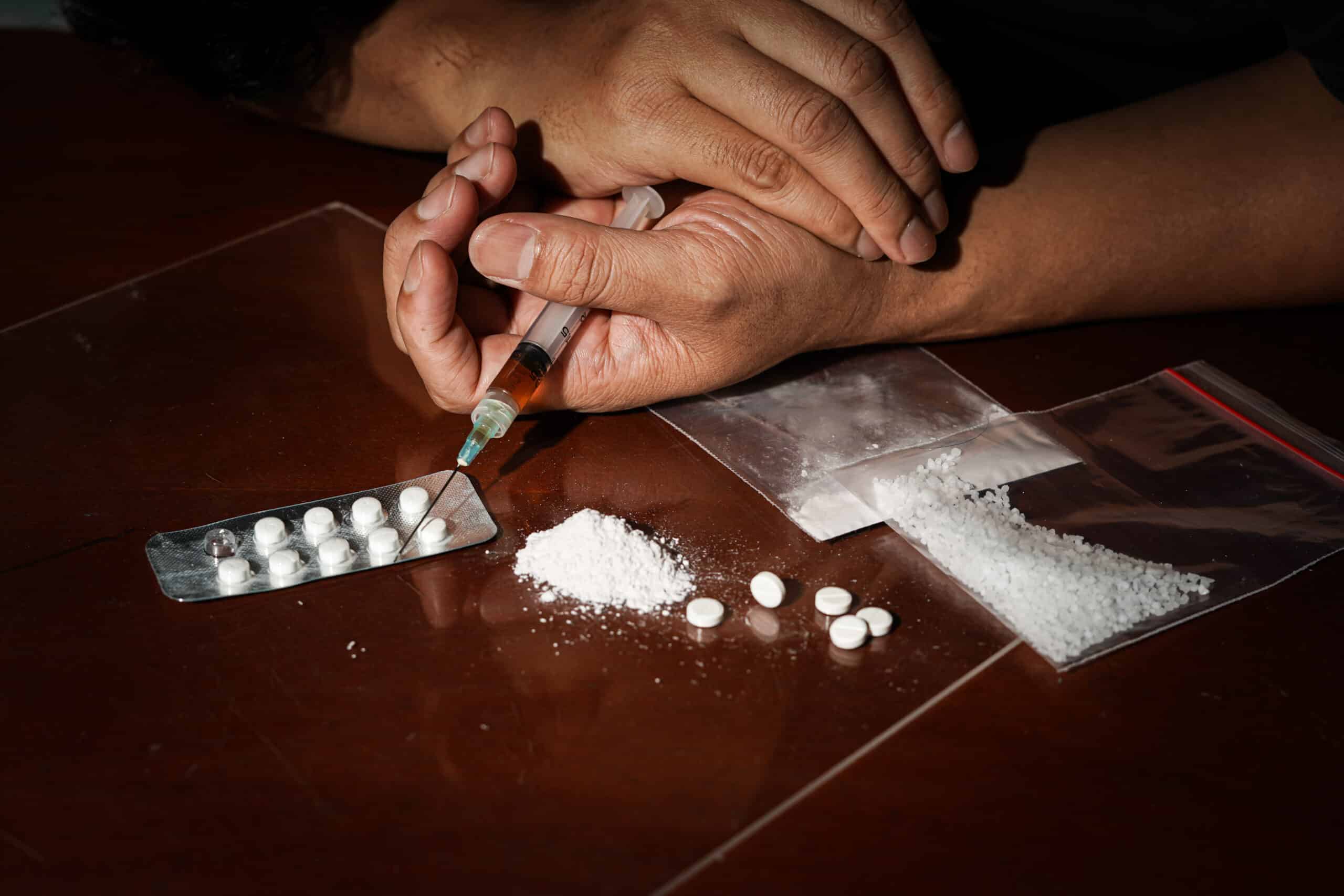Meth Addiction Treatment in Worcester
Methamphetamine is a highly addictive stimulant that affects your central nervous system. Its powerful effects on the brain’s dopamine system make it easy to become dependent on the drug after just a few uses.
Meth addiction can cause severe physical, mental, and behavioral damage, impacting every part of life. But recognizing the signs of this stimulant use disorder and seeking effective treatment can make a huge difference in recovery outcomes.
Addiction to meth doesn’t have to be a life sentence. Learn more about meth addiction, treatment options at Blue Hills Recovery, and how to get help and break the addiction cycle for good.
What is Meth Addiction?
Methamphetamine addiction is a chronic condition where someone feels compelled to keep using the drug, even when it damages their life.
It can begin as early as the first use, during which a surge of dopamine in the brain leads to feelings of intense pleasure. This feeling causes people to take meth again in an attempt to experience that same high.
Meth addiction can affect anyone, regardless of their age or background. It often disrupts health, relationships, and daily responsibilities.


Why Do People Form Meth Addictions?
Meth addiction develops gradually over time through repeated drug use. Initially, people experience an intense euphoria or “rush” from meth use. But as they continue using, their brains become dependent on the drug to feel these effects.
With repeated use, the brain’s ability to regulate dopamine — the “feel good chemical”— diminishes, making it harder to enjoy everyday activities. This leads to compulsive drug-seeking behavior, which is the hallmark of addiction.
At Blue Hills Recovery, we work to help people break these behaviors and replace them with healthier habits.
What Causes Meth Addiction?
Methamphetamine addiction occurs because of the chemical changes that meth triggers in the brain. The drug causes a rapid release of dopamine, which is responsible for feelings of pleasure and reward. As dopamine levels rise quickly, users feel an intense “high.”
But chronic meth use causes the brain to adapt, leading to long-term changes in brain function. As the brain becomes reliant on meth for dopamine, those using meth find it difficult to quit.
Addiction develops because the brain is no longer able to experience pleasure or function normally without the drug.
Risk Factors for Meth Addiction
Meth addiction can affect anyone, from any walk of life. However, there are certain factors that make some people more likely to develop a substance use disorder than others.
Risk factors for developing a meth addiction include:
- Family history of substance or meth abuse
- Early substance use
- Experiencing trauma
- Trouble with the criminal justice system
- Environmental factors
- Other drug use
- Mental health disorders

Who is Affected by Meth Addiction?
Anyone can develop a meth addiction, regardless of their background or circumstances. But certain groups are more vulnerable than others.
Meth addiction data shows the following trends:
- Gender: Men are more likely to use meth (8.7 per 1,000) compared to women (4.7 per 1,000).
- Age: Meth use is highest among adults aged 26-34 (11.0 per 1,000), followed by adults aged 18-25 (9.3 per 1,000).
- Socioeconomic factors: Low education, low income, lack of insurance, and unstable housing are linked to higher American meth use rates.
- Health conditions: People with hepatitis, HIV/AIDS, sexually transmitted diseases, depression, or suicidal thoughts are at a higher risk of meth addiction.
- Substance use: Those who use nicotine, cannabis, alcohol, or opioids are more likely to develop a meth addiction.
Studies show the following meth addiction rates according to race:
- White, non-Hispanic: 7.5 per 1,000 adults
- Hispanic: 6.7 per 1,000 adults
- Other, non-Hispanic: 5.6 per 1,000 adults
- Black, non-Hispanic: 2.5 per 1,000 adults

Effects of Using Meth With Alcohol and Other Drugs
Some people use more than one drug to manage or enhance the effects of meth, which is known as “polydrug use”.
Those involved in polydrug use are more likely to experience mental health issues, reduced cognitive function, and engage in dangerous behaviors like binge drinking and overdose.
Using multiple addictive substances makes treatment less effective, with higher rates of relapse and recovery drop out.
Meth Addiction Signs
Methamphetamine affects the body, mind, and behavior in both the short-term and the long-term, often causing severe damage.
Physical Signs
Meth use takes a heavy toll on the body, often leading to noticeable physical changes which can worsen over time.
Physical signs of meth addiction include:
- Weight loss and malnutrition
- Dilated pupils (mydriasis)
- Increased heart rate (tachycardia) and high blood pressure (hypertension)
- Elevated body temperature
- Nausea and vomiting
- Severe dental problems (“meth mouth”)
- Skin sores from excessive picking
- Seizures and convulsions
Mental Signs
Meth addiction disrupts brain function, leading to major mental health problems.
Meth addiction affects mental health by causing:
- Paranoia and hallucinations
- Anxiety and panic attacks
- Psychosis
- Memory loss and confusion
- Insomnia
- Depression
Behavioral Signs
Behavioral changes can be dramatic, often leading to risky or dangerous actions that affect not only the individual but those around them.
Behavioral signs of a meth addiction include:
- Mood swings
- Violent behavior
- Increased energy
- Repetitive activities
- Isolation
- Risky behaviors
Using meth can also lead to “tweaking,” which is marked by extreme paranoia, irritability, and dangerous behavior due to sleep deprivation.
What Happens When Meth Addiction is Left Untreated?
When meth addiction is left untreated, the brain stays locked in a cycle of dependence. Mentally, users may experience worsening paranoia, anxiety, psychosis, and memory loss. Emotionally, addiction causes deep depression and feelings of hopelessness.
Meanwhile, untreated meth addiction leads to severe physical consequences, including cardiovascular disease, heart attack, stroke, organ failure, Parkinson’s disease, and general cognitive decline.
As well as the personal health toll, untreated addiction impacts every aspect of life. Relationships with family and friends deteriorate, work performance suffers, and financial stability is threatened.
Meth Addiction Treatment in Worcester, Massachusetts
Blue Hills Recovery is a Worcester, Massachusetts treatment provider that offers comprehensive care, helping you detox, recover, and build a foundation for long-term sobriety.
Meth Detox Programs
Meth Addiction Rehab Programs
Day Treatment/Evening Treatment for Meth Addiction

Get Treatment for Meth Addiction at Blue Hills Recovery
If you or your loved one is struggling with meth addiction, we’re here to help. At Blue Hills Recovery, you’ll find expert care, personalized treatment plans, and a dedicated staff committed to helping you heal.
We know recovery isn’t easy, but with the right guidance, you can overcome meth addiction and reclaim your life. Contact Blue Hills Recovery today to learn more about our meth addiction treatment in Worcester and take the first step toward true recovery.
Meth Addiction Treatment in Worcester FAQs
What does meth addiction look like?
How do you overcome a meth addiction?
What happens if you quit meth abruptly?
How can you help someone with a meth addiction?
Sources
Let’s talk about how we can help.
A Life of Healing Can be Yours.
You deserve to become your best self. With decades of combined experience in the field of addiction medicine, our staff knows what it takes to build a foundation for recovery.